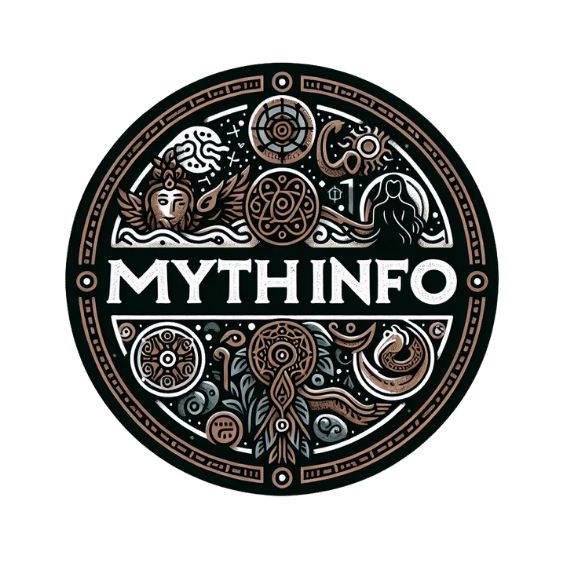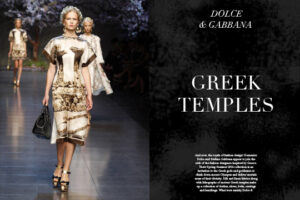
Greek mythology has long been a source of inspiration across various forms of art, literature, and culture. The influence of ancient Greek legends has permeated the fashion industry, where designers draw upon the rich tapestry of myths, gods, and goddesses to create stunning and timeless styles. This article delves into the ways in which Greek mythology shapes contemporary fashion, highlighting key elements that make this influence both enduring and trendsetting.
The Allure of Greek Mythology
Greek mythology is filled with powerful deities, heroic figures, and captivating tales that embody universal themes of love, power, and beauty. The timeless allure of these stories lies in their ability to transcend time and resonate with modern audiences. In fashion, designers tap into this allure, using mythological references to evoke a sense of mystery, grandeur, and timeless elegance.
Key Elements of Greek Mythology in Fashion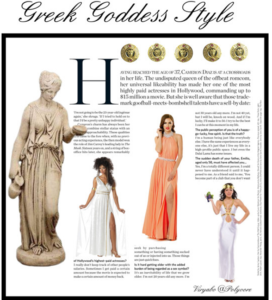
- Draping and Silhouettes
- Chiton and Peplos: The ancient Greeks were known for their draped garments like the chiton and peplos, which are often reinterpreted in modern fashion. These flowing silhouettes are celebrated for their elegance and simplicity, influencing everything from evening gowns to casual wear.
- Grecian Draping: Contemporary designers often incorporate Grecian draping into their collections, creating garments that flow gracefully and accentuate the natural curves of the body. This technique adds a touch of classical sophistication to modern fashion.
- Mythological Symbols and Motifs
- Olive Leaves and Laurel Wreaths: Symbols of victory and peace in Greek mythology, olive leaves and laurel wreaths are frequently used in fashion accessories and embellishments. These motifs can be seen in jewelry, headpieces, and embroidered details on garments.
- Greek Key Pattern: The meander or Greek key pattern, symbolizing infinity and unity, is a popular decorative element in fashion. This geometric design is often found in prints, trims, and accessories, adding a touch of ancient elegance to contemporary styles.
- Goddess-Inspired Designs
- Athena: The goddess of wisdom and war, Athena inspires designs that exude strength and sophistication. Her influence is seen in structured silhouettes, armor-like details, and powerful, tailored pieces.
- Aphrodite: As the goddess of love and beauty, Aphrodite’s influence is evident in romantic, flowing gowns, soft fabrics, and feminine details. Designers often channel her essence to create ethereal and alluring looks.
- Mythological Narratives in Fashion Shows
- Storytelling: Fashion shows often use mythological themes to create captivating narratives. Designers like Alexander McQueen and Versace have famously incorporated Greek mythology into their runway presentations, creating dramatic and unforgettable spectacles.
- Theatrical Elements: The use of theatrical elements such as flowing capes, intricate headpieces, and symbolic accessories helps bring mythological stories to life on the runway, captivating audiences and making a lasting impression.
Iconic Fashion Collections Inspired by Greek Mythology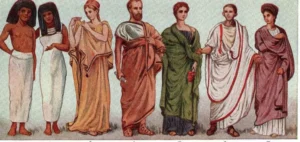
Several iconic fashion collections have drawn directly from Greek mythology, leaving a lasting impact on the industry. For instance, Versace’s 1991 collection featured Medusa motifs and Grecian draping, while Gucci’s 2018 collection paid homage to ancient Greek art and mythology with its intricate designs and mythical references. These collections highlight the enduring appeal of Greek mythology and its ability to inspire innovative and memorable fashion.
The Influence of Greek Mythology on Modern Fashion Designers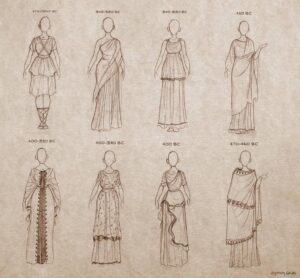
Many modern fashion designers cite Greek mythology as a key source of inspiration. Designers like Mary Katrantzou and Zuhair Murad frequently incorporate mythological elements into their designs, creating pieces that are both contemporary and timeless. Their work demonstrates how ancient stories and symbols can be reimagined in fresh and innovative ways, keeping the essence of Greek mythology alive in the fashion world.
Conclusion
Greek mythology’s influence on fashion is a testament to the timelessness and universality of these ancient stories. By drawing upon the rich tapestry of myths, symbols, and deities, fashion designers create pieces that are not only visually stunning but also imbued with deep cultural and historical significance. As long as these legends continue to captivate the human imagination, their impact on fashion will remain strong, ensuring that the style inspired by Greek mythology is always in vogu
